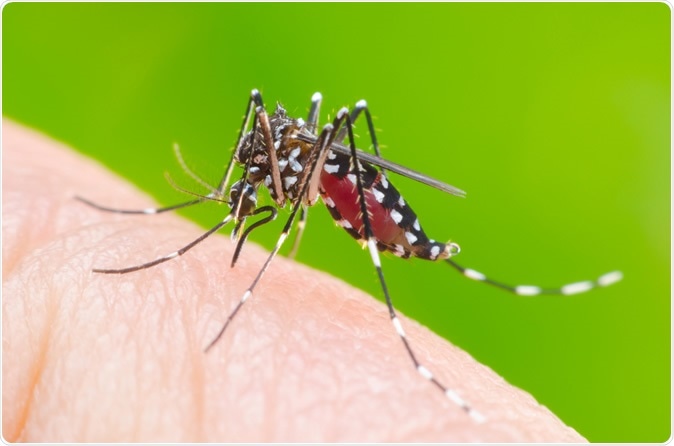The more anemic you are, the more likely it is that you could spread Dengue fever because mosquitoes feeding on your blood have a greater chance of picking up the virus. This was reported by a new study published in the journal Nature Microbiology on September 16, 2019.
Dengue is a viral disease spread through the bites of the mosquito (Aedes aegypti), primarily in the tropical areas of Central America, the northern part of South America, sub-Saharan Africa, southeast Asia and the Caribbean. It begins with fever, headache, a rash, severe muscle and bone pains, and may lead to severe complications including internal bleeding and death. It affects about 60 million people a year, of whom a fifth will have disease severe enough to require hospitalization. More than 13 500 of these people die. The healthcare costs of Dengue fever are about $9 billion each year.

Aegypti mosquito on human skin. Image credit: Khlungcenter / Shutterstock
The worst spread of Dengue today is in cities, and the increasing number of cities in the tropics brings together two high-transmission scenarios. Dengue vaccines have been made but some scientists say it worsens the features of Dengue if used in a dengue-naïve individual. Research is constantly on to find ways in which this infection can be reduced.
Dengue and blood iron
The mosquitoes which spread dengue do so by feeding on blood from Dengue patients, by which means they contract the infection themselves. They then pass it on to the non-infected individuals when they feed on the latter for their next blood meal.
The more iron in the blood, the fewer mosquitoes were infected — UConn Health immunologist Penghua Wang
The question in the current study was: do the levels of various substances in the blood play any role on the chances of mosquitoes acquiring the virus when they feed on a Dengue patient? To answer this, the researchers conducted a series of experiments, in which they added Dengue virus to fresh blood samples from healthy human volunteers. They then allowed mosquitoes to feed on the sample and tested the percentage of infected mosquitoes in each batch. The surprising variation in the number of mosquitoes infected per batch was closely linked to iron concentrations in the blood samples.
The test was run again in mouse models to validate the finding. Iron supplementation was associated with a lower percentage of infected mosquitoes following a blood meal, and a reduced number of virus particles in the infected mosquito. Conversely, when the serum iron was neutralized, the percentage of infected mosquitos rose. A third model was set up, with mosquitoes feeding on the blood of iron-deficient mice. The prevalence of the virus in these mosquitoes was higher. This was reversed when the iron levels rose, with reduced acquisition of the virus by the mosquitoes.
How does blood iron affect infection rates?
Mosquitoes also have immune systems, like humans. But the mosquito gut cells absorb free iron from the blood and produce reactive oxygen radicals to kill off dangerous pathogens, like the dengue virus. This could underlie, at least partly, the high transmission of dengue in poorer countries where iron deficiency is rife. Researcher Penghua Wang suggests, “It could be possible that iron supplementation could reduce dengue transmission to mosquitoes in those areas.”
However, there is a big issue with this proposition. The areas of the world where dengue is highly prevalent are the same areas that have high malaria rates. But contrary to Dengue, malaria-causing plasmodium parasites love iron – the more the better. Thus if iron is being supplemented to everybody in the local dengue-endemic population, it just might worsen the prevalence of malaria. Thus researchers will have to produce an accurate model of all the factors that affect this situation, before public health authorities can think of beginning to supplement iron on a population basis.
Even so, the present study will help to understand how Dengue is being spread, and in turn encourage new ways of controlling the disease. This in turn may help control other insect-borne viral infections like Zika and West Nile.
Source:
Journal reference:
Host serum iron modulates dengue virus acquisition by mosquitoes. Yibin Zhu, Liangqin Tong, Kaixiao Nie, Itsanun Wiwatanaratanabutr, Peng Sun, Qingqing Li, Xi Yu, Pa Wu, Tianshi Wu, Chen Yu, Qiyong Liu, Zhongqi Bian, Penghua Wang & Gong Cheng. Nature Microbiology (2019). https://doi.org/10.1038/s41564-019-0555-x. https://www.nature.com/articles/s41564-019-0555-x#article-info